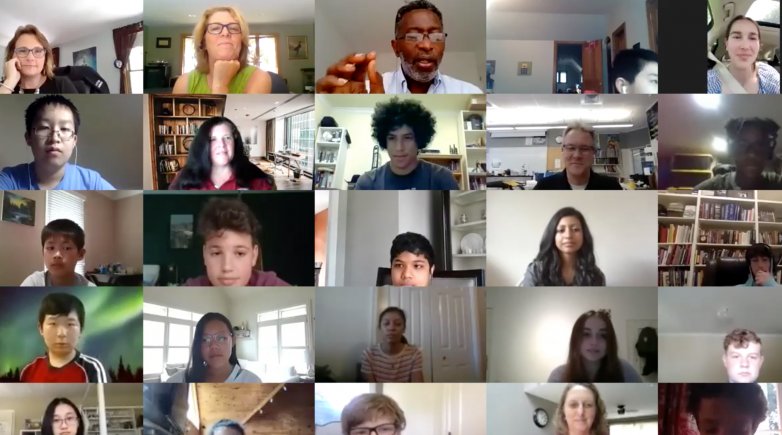Russell Weatherspoon opened the first assembly Exeter Summer 2020 with a greeting and a caveat.
“Good afternoon, Exeter,” said the longtime instructor in religion, in his second summer running the 102-year-old program.
“I say that because, where I am on the East Coast on the United States, it’s afternoon. But the fact of the matter is that many of you are listening to me and looking at all of these great faces in this rather large virtual space from many other places around the world. … Indeed, there are some of you who may have watched your families go to bed quite some time ago, but here you are, sitting by your laptop and joining us.”
Exeter Summer is a fully online experience this year. The international students who ordinarily make up more than half the five-week program’s ranks are logging in from home. More than 160 students between eighth- and 12th-grade are taking classes in a revised schedule that begins for some at 8 a.m. EDT and continues for others until 9 p.m. EDT to accommodate time-zone differences. The program continues through Aug. 8.
Among the 31 faculty members teaching this summer are veteran Academy instructors Eric Bergofsky, Courtney Marshall and Inna Sysevich, each of whom had to rapidly pivot to a distance-learning model during spring term. We asked them about that experience, what the biggest challenges were and if they discovered unexpected benefits of teaching over Zoom:
Courtney Marshall, Instructor in English 
What were your biggest takeaways from spring term?
Distance learning is exhausting! Focusing on a tiny square in a sea of squares puts a lot of strains on my eyes, so I have to build eye breaks into the class. I also build movement breaks in. Also, students might feel more self-conscious at home, so I have to be careful with potentially embarrassing activities or even remarks. And, I’m never just talking to one student. It’s important to make them all feel seen though.
What worked?
Learning everyone’s name was easier, so I love Zoom for that. Starting with a welcome question in the chat helps break the ice. A five-minute check-in and welcome question (such as “What is your favorite form of potato your favorite pasta shape?”)
What didn’t?
I think I was thinking about the whole class in the schedule block. No more! Now I organize an hourlong class as an opening, two halves, and a closing. I still won’t require camera use, but I will use the chat to keep those students engaged too.
Any pleasant surprises?
They are still students and we’re still a classroom. Zoom has helped me connect with my students in a stronger way. It’s made me a more efficient teacher and I hope, more fun!
Eric Bergofsky, Instructor in Math
What were your biggest takeaways from spring term?
It went better than I expected. The technology worked well, kids were mostly engaged as usual, and I was encouraged that with more time and planning, distance learning can be effective.
What worked?
Zoom, Canvas, and our shared Google doc that we used for students to upload and share their solutions. The shared document was so well received by students, that I plan to use it even when we go back to normal teaching.
What didn’t?
Having courses pass/fail with a low bar for passing took away some of the incentive and motivation for kids to go beyond minimum expectations. I expect even better engagement when grading is back.
Any pleasant surprises?
You can still connect with kids, have fun, have them collaborate, be challenged, and enjoy learning. It is easy for them get one-on-one help thru Zoom outside of class.
Inna Sysevich, Instructor in Modern Languages
 What were your biggest takeaways from spring term?
What were your biggest takeaways from spring term?Our difficulty with distant learning is that we can't observe each other's body language or look each other in the eyes. It's difficult to hold a discussion and to test effectively. However, some kids, who are normally feeling shy about speaking at the table are more comfortable doing so from their own environment. Kids also like one on one oral interviews- they feel supported having full attention from the teacher.
Any pleasant surprises?
I noticed that because we test less, kids compensate with thorough homework.


 What were your biggest takeaways from spring term?
What were your biggest takeaways from spring term?